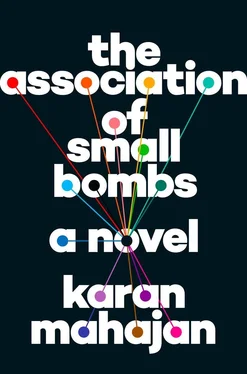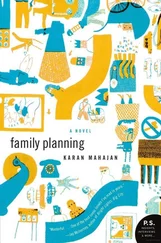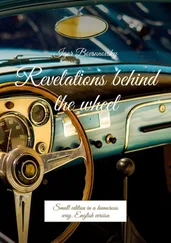After they had retired to their room to sulk, she said to Vikas, “You spoil them too much. You make all these documentaries about social issues — can’t you teach these idiots something?” She was literally spitting. Oh, how he loved it when Deepa, who was so kind and patient, got angry! How harmless her beautiful anger was!
That day, after she had busied herself in the kitchen, Vikas drove his brats to Lajpat Nagar to explain how footpath dwellers, about whom he was planning a documentary, had such difficult lives. But as soon as he got to the crowded market, with its glut of humans, heat, concrete, moving metal cars, elbows, he realized that there was something very strange about pointing out poor people in their natural habitat to children — like they were zoo animals. He had felt it when he had done his initial research, but it was somehow more pronounced now that he had two eager schoolboys with slick gelled pompadours and black shoes and shorts with him (as punishment they’d had to bathe and dress up). Worse, when they approached one of the many tiny smelly canals in Lajpat Nagar, it was clear that the footpath dwellers were not going to put up a good show. Sitting deep in their tepees of blue crinkly tarpaulin, the men were smoking bidis and playing cards. A cobbler beat a shoe to death. The potbellied children were naked and dancing. Poverty wasn’t so miserable in the winter. And Vikas realized with horror that poor people look nothing like the rich, or even the middle-class: they are a different species. To ask a child to feel sympathy for the poor is harder than getting him to feel sympathy for a chicken or a goat — at least you can see a goat being slaughtered. There is real revulsion in death. Whereas the poor keep living: dumb, insensate, nasty. They live among old newspapers, Saffola cans, Nirma bottles, Kohinoor rice sacks — brands you recognize so fiercely that you don’t see them at all, that are as familiar as any other local building material: mica, quartz, sandstone. Why do the poor refuse to give an accurate picture of their suffering? Why aren’t they frowning, or at least moaning? Vikas was almost upset at how much they were misrepresenting themselves. Then he felt bad for wanting them to be wretched — wasn’t his job to humanize them? He also felt bad that he knew no statistics that he could rattle off to stupefy the boys.
They were looking at him, waiting. Finally, he took them to a shop in the Central Market, where they examined cricket bats together. The bats were as large as they were and smelled of linseed oil. Still, the boys looked grateful and were quiet, like two convicts on bail, and they were even quieter when Vikas paid for the bat. Outside, they made pretend cricket strokes with it. “He’s hit a six out of the park and now Jonty’s coming in to field…,” Nakul whispered, commentating under his breath. Vikas rested his back against the crumbling wall of the tiny park at the center of the market and looked at the name of the shop: Honey-Money Top Sports. What a crazy name! he thought. What a crazy world!
Later, this shop too would burn in the bombing.
________
Back in the present, Vikas’s visions continued.
Why me? he wondered, sitting on his toilet and grabbing fistfuls of his hair. Was I Hitler in my past life? Did I massacre a million people and forget? Was I Stalin, General Dyer, Cortes, or Ashoka before his conversion? He looked into the mirror and saw his unshaved mouth and upper lip and felt deeply crazy, cracked. His mind was drawn repeatedly to the texture of the bomb — metal, nails, heat, fire, plastic, mud: Didn’t that all correspond somehow with the texture of his life ? The gooey plasticky smell of his shower curtain? The dirty gray terrazzo of the floor? The strange oil refinery of the Fiat’s engine, into which he so often had to dunk his head just to get the thing to start? The orange magenta heat into which he so often ventured with his tripod? The poorer you are, the closer you are to machines in all their nakedness and grit. The suave decoration of consumer electronics falls away. Vikas felt he understood the bomb. It was part of his world.
One day, in a great confusion, not knowing where his wife was, he found himself walking around Connaught Place. It was October and everyone’s face was red and inflamed with sickness. The office workers wiped their mouths with hankies or the backs of their hands — the end of lunch. He walked about in the dust and his black pants were painted white from the bottom up. Vikas had been many times to Connaught Place — his old Arthur Andersen office had been in the market — but in all those years, he had never bothered to look up, to lift his head above the ground floor, with its old, circular, white-plaster colonial British construction and cool corridors and robust colonnades. Looking up now, he saw a big, broad, deep-blue, hot, arid metal sign that read through the hard glitter of sunlight: STATE BANK OF INDIA. The words were repeated underneath in Hindi. There were numbers on the board — the pin code, a phone. An insignia that might have been a peacock.
Vikas began to weep. He couldn’t stop.
What was it about this sign? Something about its familiarity, perhaps — he must have seen a sign for the State Bank of India a million times in his life, on endless crossings and in the tiniest marketplace. But the feeling went deeper as Vikas stood under the big board, looking up from the tarred earth, crying into his sleeve. It was the crying of a man who is not long for this world, and for whom the tiniest signs of belonging are enough to spur a great sense of loss. The government, with its stupid boards, its multilingual blandness, its boring acronyms, had been there for him since his childhood. It had seen him grow up. Through its boards it had told him: You are here. You are in India. You exist.
Do I exist? Vikas thought. Yes. Thanks to the State Bank of India.
I have started to love anything that exudes great power, he thought. To love anything that touches me from a great distance.
And why couldn’t the State Bank of India be God? Who had proof that it wasn’t God? What if the government of India was God?
He realized that, walking randomly, he had arrived at the Arthur Andersen office. He stood outside a small door in the curving edifice of the market; beyond it, steps fed into the second floor. What would have happened if he had kept his job as a chartered accountant? Vikas wondered now, imagining an alternative life for himself. Why was I so foolish? I must have been suffering from a fever when I resigned; that’s the only thing that can explain it.
He couldn’t remember in this depressed state that he had hated his job as a CA, that the work had been so dull that his body had developed phantom pains and a sinus problem to keep his overactive brain annexed while it ran helter-skelter over spreadsheets — no, what he remembered instead was the visual grandeur of the Arthur Andersen office, which annexed the entire second floor and bulged with views of the street — the windows so ancient, with such congealed glass, that you felt they were quietly weeping light. And of course the whip-smart cadet-like CAs who came every morning in their suits, looking very British and unfazed, some of them with combs still sticking out of their back pockets. The tables piled with fresh-smelling paper. Above all this, the enormous distant ceiling fans that shivered like the antennae of insects and patrolled the sprawling empire of paperwork with their breeze….
In the afternoons Vikas would go down the corridor and lean against the cool, hard plaster wall, feeling dizzy. When people passed by he’d rakishly bunch up his hair with one hand, cock his head to the side, and nod — his way of waving stylishly, though every time he did it he felt fake: it was not an original gesture but one he had stolen from a friend who was something of a playboy. Does everyone steal gestures? Vikas wondered. The workers in the corridor were bright and vigorous, moving with the assurance of people who know that the great horror of their lives — the big exams, their private world wars — are behind them. Yet they too must have been the sum of small thefts. The years of your chartered accountancy exams were years of nervousness, where you were still a child. You had a constant sense of falling. You were in the trenches with your guidebooks but when you came out you were on your own, dodging multiple-choice bullets. Meanwhile your self-esteem fluctuated. Some of your friends who had done wiser things — engineering or family business, for example — might already be married, and when you came into the company of these people you naturally looked up to them…. Or no. This theory was flawed. If Vikas had to be honest with himself he had stolen gestures aspirationally, from the people he knew he would never be, like Prabhat the playboy. And more weirdly, he had stolen gestures from people whose hand motions or mannerisms he had initially found ugly, loud, objectionable, weird. Dilip Patrekar, for example. The man had a loud hyena laugh: not exactly infectious. Within a year Vikas was emitting the laugh as well. Same with his college friend Mahinder, the sardar: a short, stout character with unblinking psychopath eyes, but popular nevertheless and a great success with girls… he would often make a gesture while talking in which he held one hand out and rotated it endlessly, as if rubbing a cricket ball against the air — really, it was a way of giving artificial momentum to a story that may be boring, and you could track how far along you were in the story by how much the rotation had sped up: the faster it was, the further along you were, and when it stopped, the story stopped, and the net effect was quite satisfying. So Vikas had stolen this as well.
Читать дальше












